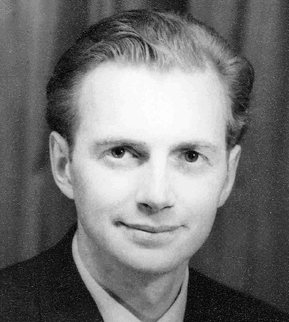Dennis Potter
|
1935 - 1994
Journalist, novelist, cultural commentator, broadcaster, producer, director, and playwright, he quickly became one of the towering figures of UK television with an influence that continues to this day. He recognised television’s potential to reach all sectors of society, and saw television drama as having an ability (like the novel) to show us the thoughts and motivations of the characters, challenge the dominance of 'realism' with fantasy, song and dance routines, and actors lip-synching to popular song. As well as forty or so television dramas he also wrote for the big screen, adapting his own plays, as well as the work of other writers. Internationally renowned & feted, well-travelled, open-minded, and intellectually engaged, the people and places of the Forest of Dean remained vitally important to him throughout his life, appearing in and influencing many of his best works: ‘A strange and beautiful place, with a people as warm as anywhere else, but they seemed warmer to me.’ LIFE & cAREERHe was born on May 17th 1935 in Joyford, close to the village of Berry Hill, his mother a Londoner, his father a Forester and coal miner. Dennis went to nearby Christchurch School, and attended the local chapel. He spent a short spell in London with his mother’s family, but missed his Forest home having, 'cried with the kind of sick passion of those who love a place almost as much as they love a person.' Bright and hard-working he graduated to Bells Grammar School in Coleford, but later transferred to St Clement Dane’s School in Fulham, where he had family. Dennis would become a life-long supporter of Fulham football club. In 1953 he began compulsory national service working for military intelligence as a Russian translator - a period he later drew on for his TV drama Lipstick On Your Collar (1993). It was during this time that he met Ken Trodd who would, as producer, become his long-term creative partner. After a brief spell working at Meredith and Drew biscuit factory in Cinderford, Dennis was accepted at New College Oxford to study Politics Philosophy and Economics. It was here that he began to make a name for himself in student drama productions (winning praise from The Stage), speeches at the Oxford Union, and writing for and later editing the influential student newspaper The Isis. After writing an article for The New Statesman and appearing on the BBC Home Service (in both as editor of The Isis) he came to the attention of Jack Ashley who was planning a TV series, Does Class Matter? (1958). In this Dennis spoke about the tensions between his working-class roots and his new life at Oxford – an experience later reflected in his TV drama Stand Up Nigel Barton (1965). All the while he was regularly returning to the Forest to see his family and friends, and take part in village life. Whilst still a student he wrote his first book A Glittering Coffin (published 1960), and in 1959 he began work as a BBC trainee. Whilst working on Panorama he helped produce a piece on the closure of pits in the Forest of Dean – an item that featured his father and a family friend. He also worked on the programme Bookstand where he began writing scripts for dramatisations of book extracts. It was during this period that he wrote and presented his documentary Between Two Rivers (1960). Highly personal, this piece on change in the Forest of Dean attempted to show how his own views on the area had changed – he now recognised the value of the Forest and saw it as a potential bastion against commercial mass culture. There was a strong reaction against it (by some) locally, something that would have a big impact on Dennis, in part pushing him towards drama writing: “It taught me how easy betrayal is compared to…art which is not concerned with betrayal”. Around this time, he began writing for newspapers, scripts for That Was The Week That Was, and stood (unsuccessfully) for Parliament. In 1965 his first television drama, The Confidence Course, was broadcast on BBC1, starting a career that would see him, over the following 30yrs, go on to transform the medium of television drama. In 1959 Dennis married Margaret Morgan, moving back to the Forest briefly in 1966 with their young family (Jane, Sarah and Robert), before moving into Morecambe Lodge in Ross-on-Wye where they would remain for the rest of their lives. His work often reflects, sometimes significantly reworked, aspects and incidents from his own life: abuse he suffered as a child; his experiences as a Parliamentary candidate; the effects of his long-term illness psoriatic arthropathy. After being diagnosed with cancer Dennis began work on his final two television dramas, and gave his final and most memorable interview (to Melvyn Bragg on Channel 4). Just over a week after Margaret died, Dennis passed away on 7th June 1994 at home surrounded by his children. DramaHis most significant cultural and artistic impact was in television drama. Although he also wrote for the stage and the big screen (as well as sometimes producing and directing) television was the medium in which his talents found their natural home. It was television, the popular medium, (at that time with only a few channels), that was his vehicle where he could speak to millions of viewers from all sections of society.
He was prolific too, with over forty television single plays, serials, and adaptations. Miming popular music lyrics, adult actors playing children, complex layering and interplay between multiple storylines, mixing fantasy and reality were some of the techniques he used to explore ideas and exploit the potential of television. His willingness to tackle controversial themes - politics, sex and religion (often at the same time) - brought a reputation, and the attention of moral campaigners such as Mary Whitehouse. As eminent Potter expert professor John Cook writes, 'Potter constructed a personal oeuvre of such remarkable character and consistency that it may never be equalled, anywhere, in the history of the television medium'. Many of his best loved plays were set in and filmed in the Forest of Dean, often at the request of Dennis himself, including the use of local extras. Plays featuring or set in the Forest of Dean... A Beast With Two Backs (1968) - inspired by real life events, and filmed on location in and around Lydbrook. Pennies From Heaven (1978) - early episodes filmed on location around Berry Hill featuring local school children. Arthur Parker is seduced by/seduces local teacher Eileen. Blue Remembered Hills (1979 ) - although there's no mention of the Forest, and it was not filmed here, the dialect of the script is unmistakeable, and for viewers it's often seen as representing a Forest childhood they remember. The Singing Detective (1986) - Phillip remembers his Forest childhood.. Cold Lazarus (1996) - the preserved head of Daniel remembers courting his 'green eyed beauty' in the 'Forest of Nead'. non-FictionHis earliest published works were non-fiction - contributions for The Isis and back home for The Dean Forest Guardian. His first published book, The Glittering Coffin (1960) was a sweeping assessment and analysis of class, politics and society, very much the work of an aspiring Oxford graduate. Two years later, we see an already more mature writer in his work The Changing Forest: a social enquiry into the Forest of Dean (1962). Reworking some of the ideas from his TV documentary Between Two Rivers (1960) this detailed exploration of the place, its people, culture and economy memorably opens in 'The Club' with a description of the old people, their habits and language, who, 'speak with a wide, beautiful splattering of chapel language, and use a hundred-fold country and coal-mining superstitions and prejudices.'
Soon after, around the time of his first serious bout of psoriasis taking its toll he took on the role of television critic for The Daily Herald newspaper. As his own television career took off he continued to contribute journalism to titles such as New Society (including covering the Aberfan disaster), The Sun, The Times, Sunday Times, New Statesman, and The Guardian. His journalism was sharp, funny, intelligent, provocative. Published non-fiction books The Glittering Coffin (1960) The Changing Forest (1962) Potter on Potter (1993) edited by Graham Fuller Seeing the Blossom: two interviews and a lecture (1994) Dennis Potter, The Art of Invective: selected non-fiction 1953-94 (2015) edited by Ian Greaves, David Rolinson, John Williams |
NovelsWith such a prolific television career his novels have received far less attention. Worthy of reading in their own right, characters, storylines and ideas are often familiar from his film and television work, and his own life. In his first, incomplete and unpublished novel, A Country Boy, (manuscripts held by the Dennis Potter Archive at Dean Heritage Museum), there are scenes that resurface in Stand Up Nigel Barton (1965), and in The Singing Detective (1986). Pennies From Heaven (1978) was written for television, and then film (released 1981), before being turned into a novel (1981) with the story, as in the film, relocated to America. One of Potter’s most controversial drama serials, Blackeyes (1989), was still in development when he rewrote it and had it published as a novel, arguably more successful than the play in conveying the complex relationship between the protagonist, reader/viewer and authorial voice. Ticket to Ride (1986) is replete with themes and characters recognisable from his previous plays and itself was adapted for the screen as Secret Friends (1991). Probably his most complex and ‘tricksy’ novel Hide and Seek (1973), with its uncertain relationship between its main character Daniel and the book’s author, is the only one to feature the Forest of Dean. The book opens with Daniel Miller fleeing London for the Forest. Later, back in London, he yearns once again for refuge: I think now of the way the shaggy but emaciated-looking, dull-eyed sheep who wander so wearily about the paths and tracks of the Forest of Dean find their way into the brick bus shelters on nights such as this. They huddle sensibly together in heaps of dirty wool while the pitiless wind shifts and howls between the shivering trees or flaps with daemonic aggression at the corrugated sheets of the sheds, outhouses and garages along the village road. I could do with their company at this moment. I want to share in that ordinary, uncomplicated animal warmth, free of human complexities or human odours, their breath sweetened with the juices of twice-digested grass and other comely vegetation plucked from remembered waysides. Published Novels Hide and Seek (1973) Pennies From Heaven (1981) Ticket To Ride (1986) Blackeyes (1987) |
Sources
- Dennis Potter: the authorised biography (1998) by Humphrey Carpenter
- The Passion of Dennis Potter (2000) edited by Vernon W Gras & John R Cook
- Fight & Kick & Bite: the life and work of Dennis Potter (1995) by W. Stephen Gilbert
- Dennis Potter, The Art of Invective: selected non-fiction 1953-94 (2015) edited by Ian Greaves, David Rolinson, John Williams
- The Glittering Coffin (1960) by Dennis Potter
- Seeing the Blossom: two interviews and a lecture (1994) by Dennis Potter
- Pottermatters website
- Dennis Potter: the authorised biography (1998) by Humphrey Carpenter
- The Passion of Dennis Potter (2000) edited by Vernon W Gras & John R Cook
- Fight & Kick & Bite: the life and work of Dennis Potter (1995) by W. Stephen Gilbert
- Dennis Potter, The Art of Invective: selected non-fiction 1953-94 (2015) edited by Ian Greaves, David Rolinson, John Williams
- The Glittering Coffin (1960) by Dennis Potter
- Seeing the Blossom: two interviews and a lecture (1994) by Dennis Potter
- Pottermatters website
Comments
Have you read one of Dennis Potter's novels or other books? Tell us what you think here - or send it to us via our contact page and we will put it here....



